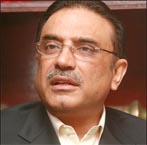Difficult for Zardari to save his chair following SC verdict against NRO: Experts
 Islamabad, Dec. 17 : Following the Pakistan Supreme Court’s monumental judgement declaring the National Reconciliation Ordinance (NRO) as ‘unconstitutional’, corruption cases against President Asif Ali Zardari are set to be re-opened.
Islamabad, Dec. 17 : Following the Pakistan Supreme Court’s monumental judgement declaring the National Reconciliation Ordinance (NRO) as ‘unconstitutional’, corruption cases against President Asif Ali Zardari are set to be re-opened.
“The NRO is in conflict with the constitution,” the court, headed by Chief Justice Iftikhar Muhammad Chaudhry, said in a late-night decision.
The apex court’s ruling has lent a voice to the opposition’s call for Zardari’s resignation, and experts believe that it would be a difficult task for the President to save his chair amidst the fast multiplying demand for his resignation.
“With no moral authority it will be difficult for the President to stay in power,” The Times quoted Hasan Askari Rizvi, a former professor of politics at Punjab University and a leading political commentator, as saying.
Political leaders involved in massive corruption cases is not a new thing in Pakistan, but the scale of Zardari’s undisclosed assets has shocked many.
The President, who was known as ‘Mr. 10 percent’ during Benazir Bhutto’s regime, has been accused of accumulating assets worth 1.5billion dollars (900million pounds) around the world through illegal means.
While the apex court’s verdict is likely to witness restoration of all corruption cases against Zardari, including a money-laundering case in a Swiss court, Presidential spokesperson, Farhatullah Babar, stressed it would not affect the immunity enjoyed by the President.
“We believe that no criminal case can be instituted or continued in any court against a president or a governor during the term of office. So, this doesn’t affect the president of Pakistan,” Babar told media persons minutes after the judgement, which is being described as a defining moment for the judiciary in the country.
However, legal experts seem to differ on the repercussions of verdict.
Some believe that the 17- member bench ruling could open the way for a challenge to the legitimacy of Zardari’s election to the top post, but others opine that Zardari enjoys immunity under Article 248 of the constitution for the cases pending in the country’s courts.
“Presidents of US, India and France also enjoyed exemption from appearing before the courts,” said retired Justice Fakharuddin Ibrahim.
Former Supreme Court Bar Association president Aitzaz Ahsan also backed Ibrahim, saying : “He (Zardari) would not be affected by the decision. A sitting president could not be summoned in court and no action could be taken against him.” (ANI)